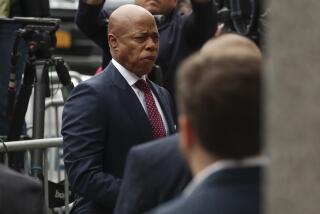New Jersey Corruption String Continues
- Share via
NEWARK, N.J. — The five mayors of New Jersey cities accused of corruption over the last year--including four who were convicted or pleaded guilty--are just the latest in the state’s history of graft.
Why so much corruption in such a small state? Observers say it’s because in New Jersey, the nation’s most densely populated state, too many people have too much access to too much money.
“It’s like Willie Sutton said when he was asked why you rob banks: ‘That’s where the money is,’ ” said James Hughes, a professor of urban planning at Rutgers University.
Hughes said New Jersey also has more government because the state is chopped into 21 counties and 567 municipalities.
The state’s history of corruption dates back to earlier this century when bosses from Frank Hague in Jersey City to Frank Farley in Atlantic City controlled their fiefdoms with who-you-know politics.
Early this month, Parsippany-Troy Hills Mayor Frank Priore was accused in a federal indictment of helping to embezzle $5,100 from the township’s self-insured dental plan. He angrily denies the charges.
Five days earlier, Passaic Mayor Joseph Lipari was convicted on federal charges of tax evasion and conspiracy.
Within the last year, former mayors of Jersey City, Atlantic City and Manchester Township also have been convicted of or have pleaded guilty to corruption charges.
“I think what you see is a matter of numbers,” said Donald Fauerbach, executive director of the New Jersey Mayors Conference. “I don’t think it’s anything endemic to the state.”
Atlantic City Mayor Jim Whelan, who defeated James L. Usry in 1990 while Usry was under indictment, said his beach resort city has a history of residents looking to government for jobs when the tourists leave.
That reliance on government jobs leaves open a lot of abuse possibilities, Whelan said. Usry pleaded guilty last December to taking a $6,000 contribution without intending to report it.
Former Jersey City Mayor Gerald McCann, who was convicted last December of bank fraud and tax evasion. Former Manchester Township mayor Joseph Murray was convicted in June for helping to steal $2.25 million from the municipality.
Whelan said the answer lies in mayors enforcing a tough code of ethics in municipal government.
Ed McCool, executive director of Common Cause, said 75% of the state’s municipalities lacked an ethics code before enactment of the state’s year-old local government ethics law, which requires financial disclosure.
“If you ask them, they say they didn’t need one,” McCool said. “You don’t need them until somebody gets in trouble.”
Rob Stuart, director of the New Jersey Public Interest Research Group, said corruption won’t disappear until the public gets involved and holds its politicians accountable.
U.S. Atty. Michael Chertoff hopes the prosecutions send a message to the public and to politicians.
“Public service is not an opportunity for enrichment,” Chertoff said. “You don’t serve as a public official so you can rob the public till.”
More to Read
Sign up for Essential California
The most important California stories and recommendations in your inbox every morning.
You may occasionally receive promotional content from the Los Angeles Times.










